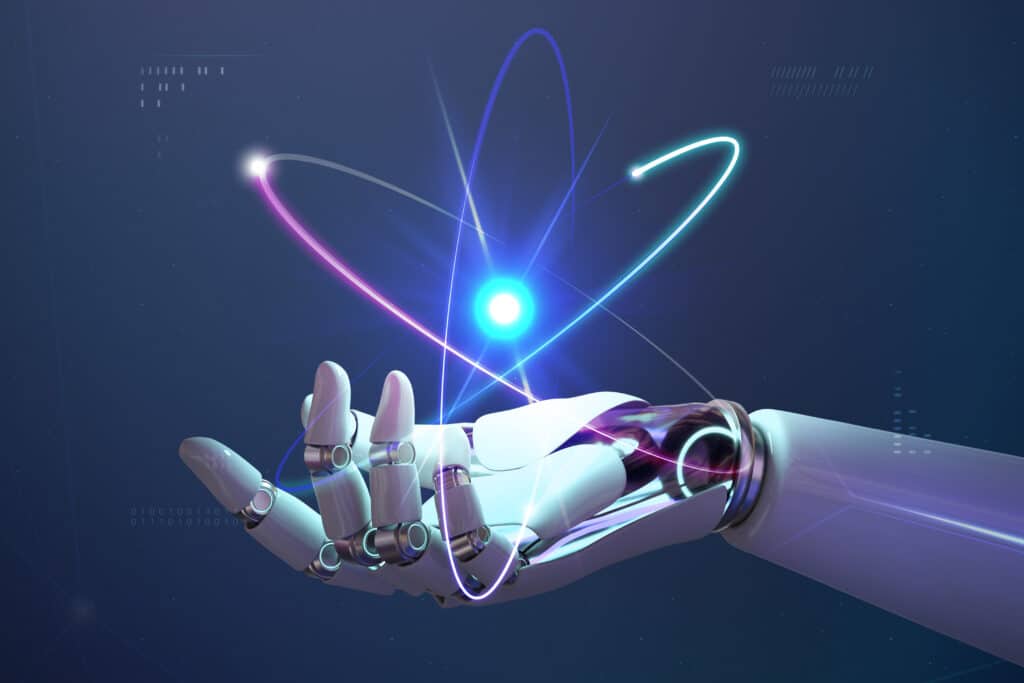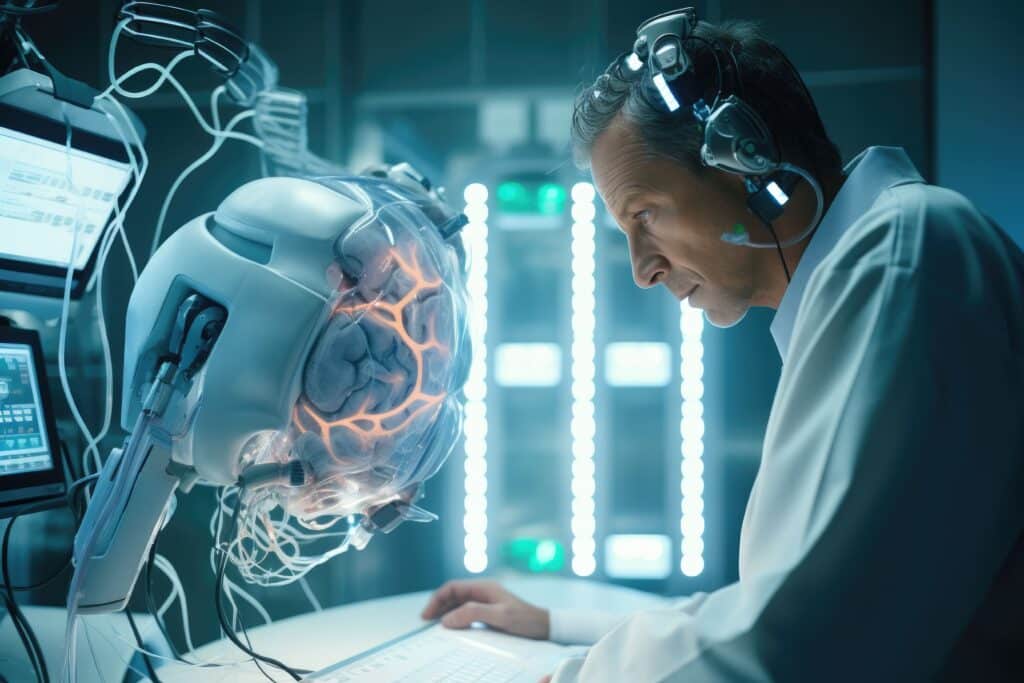
Pros & Cons of Artificial Intelligence in Healthcare Industries
Introduction
The integration of artificial intelligence (AI) in healthcare is rapidly transforming patient care and medical practices across the globe. Once perceived as a futuristic concept, AI has now established itself as a crucial component in healthcare advancements. From diagnostics to treatment planning and personalized medicine, AI is reshaping how we approach medical care. By 2024, AI’s impact on patient care has reached new heights, delivering unprecedented precision, efficiency, and accessibility.
In this comprehensive blog, we will explore how AI is revolutionizing healthcare, the various ways it is applied, its benefits, challenges, and the future of AI-driven healthcare.
The Role of AI in Healthcare: A Broad Overview
Before diving into specific use cases, it’s essential to understand the scope of AI in healthcare.
What is AI in Healthcare?
AI refers to the development of systems that can perform tasks that typically require human intelligence, such as decision-making, problem-solving, learning, and pattern recognition. In healthcare, AI involves the use of algorithms and machine learning models to analyze complex medical data. It helps medical professionals make more accurate diagnoses, predict patient outcomes, optimize treatment plans, and manage resources effectively.
Key Areas Where AI is Impacting Healthcare:
- Diagnostics and Imaging
- Predictive Analytics
- Treatment Personalization
- Drug Discovery and Development
- Robotic Surgery
- Telemedicine and Virtual Care
- Administrative Tasks
AI in Diagnostics and Medical Imaging
AI’s Role in Enhancing Diagnostic Accuracy
One of the most significant ways AI is revolutionizing healthcare in 2024 is through diagnostics. AI algorithms, especially deep learning models, can analyze medical images such as X-rays, CT scans, MRIs, and ultrasounds with remarkable precision. In many cases, AI systems can detect subtle patterns that are missed by human eyes, leading to earlier and more accurate diagnoses.
Key Benefits:
- Early Detection: AI models trained on vast datasets can identify diseases in their earliest stages, such as cancer, Alzheimer’s, and heart disease, allowing for early intervention.
- Improved Accuracy: AI reduces human error in diagnostics by cross-referencing symptoms and medical images with extensive medical databases, thus ensuring a more accurate diagnosis.
- Faster Diagnosis: AI-powered systems process and interpret medical images in real time, providing quicker diagnosis for patients, which is especially critical in emergency situations.
Case Study: AI in Detecting Breast Cancer
In 2024, AI-powered imaging systems are widely used in breast cancer screenings. AI tools like those from Google Health and IBM Watson are trained on millions of mammogram images to detect even the most minute traces of cancer. Research shows that AI has surpassed human radiologists in detecting early-stage breast cancer by identifying abnormal tissue growth patterns.
Predictive Analytics in Patient Care
AI’s Predictive Capabilities: Preventing Diseases Before They Occur
Predictive analytics is a growing AI-driven tool in healthcare that uses historical and real-time data to forecast patient outcomes. AI analyzes patterns in patient data, such as medical history, genetic information, and lifestyle choices, to predict the likelihood of developing certain conditions.
Key Benefits:
- Preventive Care: AI helps identify at-risk patients, allowing healthcare providers to intervene with preventive measures before a condition becomes severe.
- Hospital Readmission Reduction: AI can predict the likelihood of hospital readmissions based on patient history, ensuring that healthcare providers address the underlying causes before they become problematic.
- Personalized Treatment Plans: AI tailors treatment plans by analyzing vast amounts of patient data, creating highly individualized care protocols.
Example: Predicting Heart Attacks
In 2024, AI algorithms integrated into wearables and patient health apps predict heart attacks based on real-time data such as heart rate, blood pressure, and sleep patterns. AI models, using data collected over time, can alert both patients and healthcare providers to signs of an impending heart attack days or even weeks in advance, reducing mortality rates.

Artificial Intelligence in Healthcare
AI-Driven Personalized Medicine
How AI Enables Precision Medicine
Personalized or precision medicine is a cutting-edge field that focuses on tailoring treatments to individual patients based on their unique genetic makeup, environment, and lifestyle. AI plays a crucial role in analyzing these complex variables and designing personalized treatment plans.
Key Benefits:
- Genomics Analysis: AI can process vast amounts of genomic data, identifying mutations and variations that could impact treatment response.
- Tailored Drug Therapies: AI systems help healthcare providers choose the most effective drugs for individual patients based on genetic factors and predicted drug responses.
- Targeted Cancer Treatments: AI assists in selecting targeted therapies that attack cancer cells based on specific genetic mutations, minimizing damage to healthy cells.
Example: AI in Cancer Treatment
In 2024, AI-driven personalized cancer treatments are widely available. AI analyzes patients’ genetic data and the molecular profile of their tumors to recommend personalized therapies. For instance, in the case of lung cancer, AI systems recommend targeted therapies that block the growth of cancerous cells with specific mutations, improving survival rates.
AI in Drug Discovery and Development
Revolutionizing the Speed and Efficiency of Drug Discovery
Drug discovery is an inherently slow and costly process. However, AI is changing the landscape by accelerating the development of new medications. By using AI algorithms to analyze biological data, AI can predict which chemical compounds will have therapeutic effects on diseases.
Key Benefits:
- Faster Drug Development: AI significantly reduces the time needed to develop new drugs by analyzing vast datasets and identifying potential candidates.
- Cost Reduction: By optimizing the drug discovery process, AI lowers research and development costs, making new treatments more affordable.
- Identifying Repurposed Drugs: AI helps identify existing drugs that could be repurposed to treat other conditions, expediting the approval process.
Example: AI in COVID-19 Vaccine Development
In response to the COVID-19 pandemic, AI-powered platforms such as DeepMind’s AlphaFold played a pivotal role in predicting protein structures and accelerating vaccine development. By 2024, AI will continue to streamline drug discovery processes, especially for rare diseases and emerging pathogens.
AI-Powered Robotic Surgery
Enhancing Precision and Reducing Risks in Surgical Procedures
AI-powered robotic surgery combines the precision of robotics with the intelligence of AI. AI helps surgeons make precise incisions, predict complications, and improve outcomes by analyzing patient data during surgery.
Key Benefits:
- Precision: AI robots can perform surgeries with a degree of precision that surpasses human capability, reducing the risk of complications.
- Minimally Invasive: AI-powered robots perform minimally invasive surgeries, resulting in faster recovery times and less scarring.
- Real-Time Data Analysis: During surgery, AI continuously analyzes patient vitals and predicts potential risks, allowing surgeons to take preventive measures.
Case Study: Da Vinci Surgical System
In 2024, the Da Vinci surgical system is widely used across hospitals globally. AI enhances its capabilities, allowing for more precise robotic movements and real-time adjustments during procedures. For instance, in prostate surgeries, the AI system detects and avoids critical nerves, reducing post-operative complications such as incontinence.
AI in Telemedicine and Virtual Care
Transforming Remote Healthcare Delivery
Telemedicine has witnessed exponential growth, particularly after the COVID-19 pandemic, and AI plays a key role in enhancing virtual care. AI-powered chatbots, symptom-checkers, and virtual assistants streamline patient care by providing instant medical advice, triaging symptoms, and scheduling appointments.
Key Benefits:
- Increased Access to Care: AI enables remote monitoring and virtual consultations, making healthcare accessible to patients in remote or underserved areas.
- Efficient Symptom Triage: AI-powered symptom checkers help patients determine the urgency of their condition and direct them to the appropriate level of care.
- Continuous Monitoring: Wearable devices, powered by AI, monitor patients’ vitals and alert healthcare providers to abnormalities in real time.
Example: AI in Mental Health Care
By 2024, AI-powered mental health apps are widely used to help individuals manage anxiety and depression. AI algorithms analyze user inputs, such as mood patterns and behavior, and provide personalized coping strategies, making mental health care more accessible and stigma-free.
AI in Healthcare Administration
Streamlining Operations and Reducing Administrative Burden
AI doesn’t only impact direct patient care but also revolutionizes healthcare administration. AI automates time-consuming administrative tasks such as billing, coding, and appointment scheduling, freeing up healthcare providers to focus on patient care.
Key Benefits:
- Automated Billing and Coding: AI systems handle billing and coding tasks with high accuracy, reducing errors and speeding up reimbursement processes.
- Efficient Scheduling: AI-powered systems optimize appointment schedules, reducing wait times and improving patient satisfaction.
- Resource Management: AI helps hospitals manage resources by predicting patient influx, ensuring adequate staff and bed availability.
Case Study: AI in Hospital Resource Management
In 2024, AI-driven hospital resource management systems are widely used to predict patient admission rates and allocate resources accordingly. These systems analyze data such as weather patterns, local events, and population health trends to ensure hospitals are prepared for surges in patient volume.
Challenges of AI in Healthcare
While AI offers numerous benefits, it also faces several challenges in healthcare:
- Data Privacy and Security: As AI relies on vast amounts of patient data, ensuring data privacy and compliance with regulations such as HIPAA is a significant concern.
- Bias in AI Models: AI models are only as good as the data they are trained on. If the data is biased, the model’s recommendations can be biased, leading to unequal healthcare outcomes.
- Regulatory Hurdles: AI-driven healthcare tools must undergo rigorous testing and approval from regulatory bodies like the FDA, which can delay their implementation.
- Ethical Concerns: As AI takes on more roles traditionally performed by humans, ethical questions about responsibility and decision-making in healthcare arise.
The Future of AI in Healthcare
The future of AI in healthcare looks incredibly promising. By 2030, AI is expected to be fully integrated into every aspect of healthcare, from diagnostics to treatment and beyond. AI-driven healthcare systems will become more autonomous, reducing the workload on healthcare professionals while improving patient outcomes. Advances in AI will also make healthcare more personalized, predictive, and accessible.
Conclusion
In 2024, AI is revolutionizing patient care in ways we could have only imagined a decade ago. From improving diagnostic accuracy and personalizing treatments to accelerating drug discovery and enhancing robotic surgery, AI is transforming every facet of healthcare. While challenges remain, the potential of AI to improve patient outcomes, reduce costs, and increase accessibility is undeniable.
The healthcare industry’s adoption of AI is just beginning, and as we look toward the future, AI will continue to redefine the boundaries of what’s possible in medicine. The question is not whether AI will change healthcare, but how quickly and profoundly it will shape the future of patient care.

